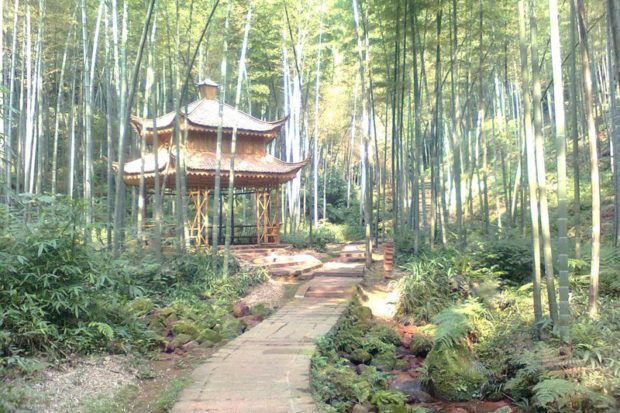
By Gene Richards
We Have to Articulate Ourselves
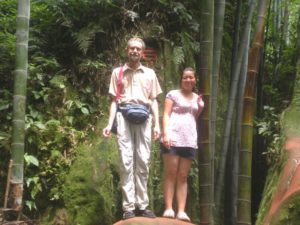
Having been overseas for so long and having got used to living in a foreign country, I’ve seen the tremendous changes that have come to China, but I’m more impressed by the fact that I’ve changed. What is different about me now? There is that ‘cocktail party stare’ that I get when I’m talking about some of my experiences – the polite, “Oh, isn’t that interesting,” expressions, but I know acquaintances have nothing to relate it to and so most is lost on them. My wealth of experience and knowledge are relatively rare but practically useless in the States. I’m just an oddity, a Bilbo Baggins who’s been, “There and Back Again,” including a sort of magic ring that might even save the world…or it might damn me, depending on how I use it. What do we expatriates know that others don’t know?
I first went to China in 1986 and came back one year later reflecting on my family values, my career and my relationships. And each time I returned to China I seemed more able to accept change and less able to live in the US. So every time I need to get away, or run away, I seem to end up returning to China. Slight attitude adjustments have far-reaching results, permutations that keep reiterating in different ways, like that toy made of small wooden squares attached by strings (some call it a Jacob’s Ladder) so that when you hang it and flip over the first one, all the others flip over, one after the other…clack, clack, clack. That’s me. Or anyone who has spent some time overseas.
Werner Herzog, the well-known film director, says,
It’s not only my dreams… The only distinction between me and you is that I can articulate them. And that is what poetry or painting or literature or filmmaking is all about. It’s as simple as that. And I make films because…I have not learned anything else. And I know I can do it to a certain degree. And it is my duty because this might be the inner chronicle of what we are. And we have to articulate ourselves otherwise we would be cows in the field.
One thing I’ve learned is that Americans are such funny people, because we basically know so little about the rest of the world, not like Europeans who have been living side by side for hundreds of years. And…we…don’t…care! We’re mostly fat, dumb and happy with this. Our reading about what goes on in other parts of the globe is distant entertainment, unfathomable strangeness, digression from the business of earning a living, of going to football games, of taking the kids to soccer practice, and the like. My concern is that we are trivializing the entire world and all the other people in it.
China Life
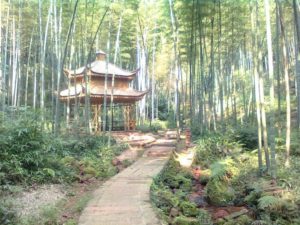
From my third floor picture window, in a fairly modern apartment complex on the outskirts of Chengdu, Sichuan Province, I look out over verdant fields – damp, warm air and frequent summer rain make everything green and sodden. I can see the tallest building of my university, nine stories, about 200 meters away. Off in the mist, high-rise apartment complexes under construction march towards us as the city expands east into the countryside, and new campuses of old universities jump out over everything. I can see a small ‘Recycle Village’ along the highway and rag pickers and dumpster-divers coming all day loaded down with bags of bottles and packaging materials on shoulder poles or large, bamboo ‘backpacks’ or piled on three-wheeled cycles. All day long, my fellow residents walk slowly along a new, narrow paved road to a large, open-air market close to the university’s back gate. That’s the world defined by my living room window.
It’s relatively quiet where I am, unlike the city proper, which is a huge metropolis in south-central China, in the Sichuan basin – the ‘rice bowl’ of China. There are many buses on the highway and, because we’re practically in the countryside (a kind of early Orange County before the suburbs outnumbered the orchards), a lot of country folk are walking or biking across the roadway, irritating the bus drivers who honk at them with the klaxon-like horns the country seems to reserve for irritated bus drivers. But it’s quiet from about noon to 2 pm because everyone is napping. In my opinion, THAT’S a very good idea.
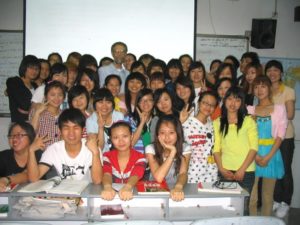
There’s something definitely different about this, but what that is, I can’t say for sure; I can just feel it. Is it this quality of the landscape and people always on the move, so much more crowded than anything I’ve ever seen in the U.S.? Or the air, the smell of cooking always present, the pollution? Or is it that there are few people hanging around with little to do except the retired folks taking their grandkids out for a walk. Which reminds me that there’s no social safety net, outside of the family, so everyone is working, many scraping by and not sharing in the double digit growth in GDP.
What I feel is not that this is another world but that it is another home besides the one I own in the Central Valley of California. What I feel is that I’ve got used to being in China after six years (this last time). I also feel how strange Chinese people are – they don’t do things the way we do (does anyone?). Sometimes their ways seem superior to ours and at other times I’m baffled and annoyed – mainly baffled but with a fair share of annoyance if the mood strikes me.
Get Used to It
What happens if you stay long enough in a place, either because you have to or something has attracted you there, is you get used to that place. In time you become accustomed to its the rhythms and accept the way things are, even if at first you couldn’t, or at first they drove you crazy. They say that what doesn’t kill you makes you stronger but most people don’t give new experiences a chance. Most people run back to the things and ways they’ve always known, and have already gotten used to. They’re not willing to give a new place a chance, especially if they meet some problem or obstruction or frustration, which is pretty much a daily occurrence for a foreigner in China. What kind of person are you?
It takes perseverance, discipline and honesty. You have to be honest that certain things drive you crazy. For me that’s hearing, “Look, it’s a foreigner,” (in Chinese) or, “Hello,” (in English) several times a day. So you have to be honest that you are the alien, you are the stranger in a strange land. You can rail against things as much as you like (and I have) but sooner or later you have to be honest about the situation. And, little by little you… get… used… to… it! My discipline is to NOT run away, to look harder at things that frustrate me, to never refuse to interact with another person. In China, you get used to people interrupting all the time while you’re trying to have a conversation with someone, especially at work or school, even students interrupt when I’m talking to the director. You get used to the masses of people, to listening to an alien tongue, to new foods, different climate, the bureaucracy, boring architecture, the…well, you get the idea.
But, what’s really different is the people. In my opinion, Chinese people have bigger hearts. I don’t know where there’s room in their chests but they get a bigger heart in there. Why do I say that? Too many Americans are too much in a hurry, too concerned with making money, too concerned with their own little insular lives and very little concerned with family, the future, maintaining friendships and being kind to one another, or the world outside their borders.
Chinese are more concerned with affairs of the heart, relations between people in a face-to-face context. If given the chance, they’d rather appear to get along, than not. Which actually leads them to get along better with each other. Generally the Chinese are very resilient and flexible. In a nation as crowded as this, it’s pretty essential. Maybe Americans can afford to be so cold to one another because we’ve never had to live so close together, and never had to rely on one another so wholly.
A Last Story
I went to visit a very good friend’s family, deep in the countryside – mud-daubed walls and thatched roof house with a well and
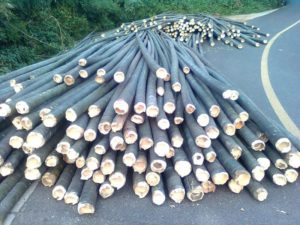
pumpand a trough of water near the kitchen. They still use the traditional kang – a large concrete stove with a hole to fit a large wok in the center and fed by twigs and small brush to make a quick, hot fire for mealtimes. Simple wooden doors and packed earth floors. Ducks and chickens roam around the small courtyard, pigs are penned in the room next to the kitchen, where there is an outdoor privy – just a hole in the ground where the combined waste can be pushed out and used in the fields. They farm about an acre in typical Chinese fields – narrow raised pathways between sunken fields and paddy culture rice, fruit trees and vegetables. Dad works on a construction crew for the farmers who have money sent home from offspring or relatives in the cities and are building better homes, but most of the time, he and mom are in the fields, bent over, just like Chinese farmers have been doing for thousands of years.
When I visited, it truly must have seemed I’d dropped off the moon – the first foreigner ever to set foot in their house, and at lunch, they were concerned that I might look down on them. I was very moved by this and told them that my father had been born and raised in very similar circumstances on the dry prairies of eastern Colorado, and that his mom had moved and taken in boarders so at least a couple of her sons could go to university. At the meal, they probably bought and served about a week’s worth of meat and other fare just to make a decent impression. Teachers are still revered in China – the expression, “Teacher for a day, father for a lifetime,” pretty much says it.
Not surprisingly, dad and mom looked much older looking than they were, had no local medical care, so lived with the aches and pains of hard work. Still, they were pretty chipper people and mom was a character who never missed a chance to chat up strangers she met in the village or on the country busses. Dad can read and write, mom can’t. Even my friend’s practically toothless grandma, who raised her, was quite cheerful, though she was much too shy to ask any questions, even with my friend’s prodding.
Just like my grandmother, my friend’s parents worked to make sure their daughter had a chance at college, where I met her, and she was their only safety net, their social security, their retirement support, their comfort in old age.
Experiences like this will change a person. Americans, quite simply, don’t know how good we have it.
*****
Contact Gene Richards at igenerichards@gmail.com.
